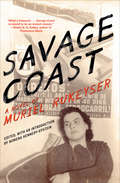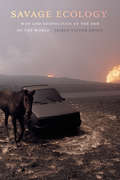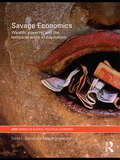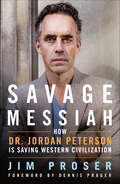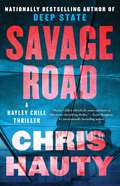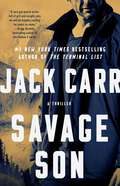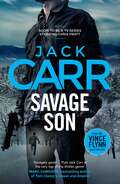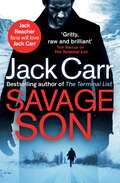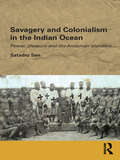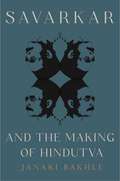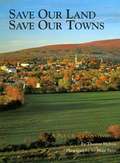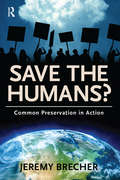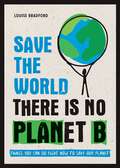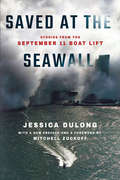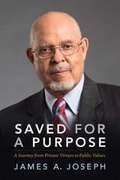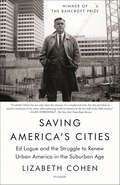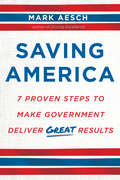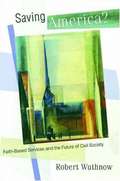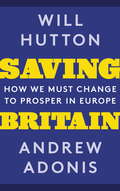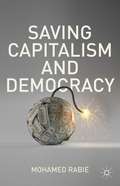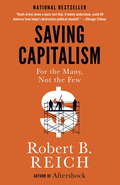- Table View
- List View
Savage Coast: A Novel
by Muriel RukeyserThe poet&’s newly discovered novel of reporting on the Spanish Civil War &“is both an absorbing read and an important contribution to 20th-century history&” (Publishers Weekly). As a young reporter in 1936, the pioneering poet and political activist Muriel Rukeyser traveled to Barcelona to witness the first days of the Spanish Civil War. She turned this experience into an autobiographical novel so forward thinking—both in its lyrical prose and its frank depictions of violence and sexuality—that it was never published in her lifetime. Recently discovered in her archive, Feminist Press finally makes this important work available to the public. Savage Coast charts a young American woman&’s political and sexual awakening as she witnesses the popular front resistance to the fascist coup and falls in love with a German political exile who joins the first international brigade. Rukeyser&’s narrative is a modernist exploration of violence, activism, and desire; a documentary text detailing the start of the war; and a testimony to those who fought and died for freedom and justice during the first major battle against European fascism.
Savage Conversations
by LeAnne HoweMay 1875: Mary Todd Lincoln is addicted to opiates and tried in a Chicago court on charges of insanity. Entered into evidence is Ms. Lincoln’s claim that every night a Savage Indian enters her bedroom and slashes her face and scalp. She is swiftly committed to Bellevue Place Sanitarium. Her hauntings may be a reminder that in 1862, President Lincoln ordered the hanging of thirty-eight Dakotas in the largest mass execution in United States history. No one has ever linked the two events―until now. <p><p>Savage Conversations is a daring account of a former first lady and the ghosts that tormented her for the contradictions and crimes on which this nation is founded.
Savage Ecology: War and Geopolitics at the End of the World
by Jairus Victor GroveJairus Victor Grove contends that we live in a world made by war. In Savage Ecology he offers an ecological theory of geopolitics that argues that contemporary global crises are better understood when considered within the larger history of international politics. Infusing international relations with the theoretical interventions of fields ranging from new materialism to political theory, Grove shows how political violence is the principal force behind climate change, mass extinction, slavery, genocide, extractive capitalism, and other catastrophes. Grove analyzes a variety of subjects—from improvised explosive devices and drones to artificial intelligence and brain science—to outline how geopolitics is the violent pursuit of a way of living that comes at the expense of others. Pointing out that much of the damage being done to the earth and its inhabitants stems from colonialism, Grove suggests that the Anthropocene may be better described by the term Eurocene. The key to changing the planet's trajectory, Grove proposes, begins by acknowledging both the earth-shaping force of geopolitical violence and the demands apocalypses make for fashioning new ways of living.
Savage Economics: Wealth, Poverty and the Temporal Walls of Capitalism (RIPE Series in Global Political Economy #19)
by Naeem Inayatullah David L. BlaneyThis innovative book challenges the most powerful and pervasive ideas concerning political economy, international relations, and ethics in the modern world. Rereading classical authors including Adam Smith, James Steuart, Adam Ferguson, Hegel, and Marx, it provides a systematic and fundamental cultural critique of political economy and critically describes the nature of the mainstream understanding of economics. Blaney and Inayatullah construct a powerful argument about how political economy and the capitalist market economy should be understood, demonstrating that poverty is a product of capitalism itself. They address the questions: Is wealth for some bought at the cost of impoverishing, colonizing, or eradicating others? What benefits of wealth might justify these human costs? What do we gain and lose by endorsing a system of wealth creation? Do even "savage cultures" contain values, critiques, and ways of life that the West still needs? Opening the way for radically different policies addressing poverty and demanding a rethink of the connections between political economy and international relations, this thought-provoking book is vital reading for students and scholars of politics, economics, IPE and international relations.
Savage Messiah: How Dr. Jordan Peterson Is Saving Western Civilization
by Jim ProserA fascinating biography and in-depth look at the work of bestselling writer and psychologist Dr. Jordan Peterson, by award-winning author Jim Proser.Who is psychologist, professor, bestselling author, and YouTube personality Dr. Peterson? What does he believe in? Who are his followers? And why is he so controversial? These are among the many questions raised in this compelling, exhaustively researched account of his life—from Peterson’s early days as a religious-school student in small-town Canada to his tenure at Harvard to his headline-making persona of the present day.In Savage Messiah, we meet an adolescent Peterson who, scoffing at the “fairy tales” being taught in his confirmation class, asks his minister how it’s possible to believe the Bible in light of modern scientific theory. Unsatisfied with the answer he’s been given, Peterson goes on to challenge other authority figures who stood in his way as he dared to define the world in his own terms. This won Peterson many enemies and more admirers than he could have dreamed of, particularly during the digital era, when his nontraditional views could be widely shared and critically discussed. Still, a fall from grace was never far behind.Peterson had always preached the importance of free speech, which he believed was essential to finding life-saving personal meaning in our frequently nihilistic world. But when he dismissed Canadian parliament Bill C-16, one that compelled the use of newly-invented pronouns to address new gender identities, Peterson found himself facing a whole new world. Students targeted him as a gender bigot. Conservatives called him their hero. Soon Peterson was fixed firmly at the center of the culture wars—and there was no turning back.With exclusive interviews of Dr. Peterson, as well as conversations with his family, friends, and associates, this book reveals the heart and mind, teachings and practices, of one of the most provocative voices of our time.
Savage Road: A Thriller (A Hayley Chill Thriller #2)
by Chris HautyHayley Chill descends even deeper into the dangerous political web of Washington, DC, in this thrilling sequel to the &“propulsive, page-turning, compelling&” (C.J. Box, #1 New York Times bestselling author) national bestseller Deep State.When a series of devastating cyber attacks rock the United States, Hayley Chill is tasked by the &“deeper state&” to track down their source. NSA analysts insist that Moscow is the culprit, but that accusation brings plenty of complications with Hayley directing the president as a double agent against the Russians. With increasing pressure on the president to steer him towards a devastating war, it&’s up to Hayley to stop the mysterious computer hacker and prevent World War III—while also uncovering some shocking truths about her own life. Magnificently crafted and superbly unpredictable, Savage Road is an edge-of-your-seat political thriller ideal for our times.
Savage Son: A Thriller (Terminal List #3)
by Jack Carr&“Take my word for it, James Reece is one rowdy motherf***er. Get ready!&”—Chris Pratt, star of the #1 Amazon Prime series The Terminal List &“A rare gut-punch writer, full of grit and insight, who we will be happily reading for years to come.&” —Gregg Hurwitz, New York Times bestselling author of the Orphan X series? In this third high-octane thriller in the &“seriously good&” (Lee Child, #1 New York Times bestselling author) Terminal List series, former Navy SEAL James Reece must infiltrate the Russian mafia and turn the hunters into the hunted.Deep in the wilds of Siberia, a woman is on the run, pursued by a man harboring secrets—a man intent on killing her. A traitorous CIA officer has found refuge with the Russian mafia with designs on ensuring a certain former Navy SEAL sniper is put in the ground. Half a world away, James Reece is recovering from brain surgery in the Montana wilderness, slowly putting his life back together with the help of investigative journalist Katie Buranek and his longtime friend and SEAL teammate Raife Hastings. Unbeknownst to them, the Russian mafia has set their sights on Reece in a deadly game of cat and mouse. As Jack Carr&’s most visceral and heart-pounding thriller yet, Savage Son explores the darkest instincts of humanity through the eyes of a man who has seen both the best and the worst of it.
Savage Son: the gripping, thrilling and adventurous novel in the James Reece series (Terminal List #3)
by Jack Carr**SOON TO BE A TV SERIES STARRING CHRIS PRATT**'Carr writes both from the gut and a seemingly infinite reservoir of knowledge in the methods of human combat. Loved it!' Chris Hauty, bestselling author of Deep State Deep in the wilds of Siberia, a woman is on the run, pursued by a man harboring secrets – a man intent on killing her. Half a world away, James Reece is recovering from brain surgery in the Montana wilderness, slowly putting his life back together with the help of investigative journalist Katie Buranek and his longtime friend and SEAL teammate Raife Hastings. Unbeknown to them, the Russian mafia has set their sights on Reece in a deadly game of cat and mouse.In his most visceral and heart-pounding thriller yet, Jack Carr explores the darkest instincts of humanity through the eyes of a man who has seen both the best and the worst of it.Praise for Jack Carr: 'This is seriously good . . . the suspense is unrelenting, and the tradecraft is so authentic the government will probably ban it – so read it while you can!' Lee Child 'With a particular line in authentic tradecraft, this fabulously unrelenting thrill-ride was a struggle to put down' Mark Dawson 'Gritty, raw and brilliant!' Tom Marcus &‘So powerful, so pulse-pounding, so well-written – rarely do you read a debut novel this damn good&’ Brad Thor 'A powerful, thoughtful, realistic, at times terrifying thriller that I could not put down. A terrific addition to the genre, Jack Carr and his alter-ego protagonist, James Reece, continue to blow me away' Mark Greaney 'Thrilling' Publishers Weekly
Savage Son: the most gripping, thrilling adventure novel you'll read this year (Terminal List Ser. #3)
by Jack Carr**NOW AN AMAZON PRIME TV SERIES STARRING CHRIS PRATT**&‘A propulsive and compulsive series. Jack Carr&’s James Reece is the kind of guy you&’d want to have in your corner. A suspenseful and exhilarating thrill-ride. Jack Carr is the real deal&’ Andy McNab Deep in the wilds of Siberia, a woman is on the run, pursued by a man harboring secrets – a man intent on killing her. Half a world away, James Reece is recovering from brain surgery in the Montana wilderness, slowly putting his life back together with the help of investigative journalist Katie Buranek and his longtime friend and SEAL teammate Raife Hastings. Unbeknown to them, the Russian mafia has set their sights on Reece in a deadly game of cat and mouse.In his most visceral and heart-pounding thriller yet, Jack Carr explores the darkest instincts of humanity through the eyes of a man who has seen both the best and the worst of it.Praise for Jack Carr: 'This is seriously good . . . the suspense is unrelenting, and the tradecraft is so authentic the government will probably ban it – so read it while you can!' Lee Child 'Carr writes both from the gut and a seemingly infinite reservoir of knowledge in the methods of human combat. Loved it!' Chris Hauty 'With a particular line in authentic tradecraft, this fabulously unrelenting thrill-ride was a struggle to put down' Mark Dawson 'Gritty, raw and brilliant!' Tom Marcus &‘So powerful, so pulse-pounding, so well-written – rarely do you read a debut novel this damn good&’ Brad Thor 'A powerful, thoughtful, realistic, at times terrifying thriller that I could not put down. A terrific addition to the genre, Jack Carr and his alter-ego protagonist, James Reece, continue to blow me away' Mark Greaney 'Thrilling' Publishers Weekly
Savagery and Colonialism in the Indian Ocean: Power, Pleasure and the Andaman Islanders (Routledge/Edinburgh South Asian Studies Series)
by Satadru SenThis book examines the social, political and ideological dimensions of the encounter between the indigenous inhabitants of the Andaman islands, British colonizers and Indian settlers in the eighteenth and nineteenth centuries. The British-Indian penal settlements in the Andaman Islands – beginning tentatively in 1789 and renewed on a larger scale in 1858 – represent an extensive, complex experiment in the management of populations through colonial discourses of race, criminality, civilization, and savagery. Focussing on the ubiquitous characterization of the Andaman islanders as ‘savages’, this study explores the particular relationship between savagery and the practice of colonialism. Satadru Sen examines savagery and the savage as dynamic components of colonialism in South Asia: not intellectual abstractions with clear and fixed meanings, but politically ‘alive’ and fiercely contested products of the colony. Illuminating and historicizing the processes by which the discourse of savagery goes through multiple and fundamental shifts between the late eighteenth and late nineteenth centuries, he shows the links and breaks between these shifts and changing ideas of race, adulthood and masculinity in the Andamans, British India, Britain and in the wider empire. He also highlights the implications of these changes for the ‘savages’ themselves. At the broadest level, this book re-examines the relationship between the modern and the primitive in a colonial world.
Savarkar and the Making of Hindutva
by Janaki BakhleA monumental intellectual history of the pivotal figure of Hindu nationalismVinayak Damodar Savarkar (1883–1966) was an intellectual, ideologue, and anticolonial nationalist leader in India&’s struggle for independence from British colonial rule, one whose anti-Muslim writings exploited India&’s tensions in pursuit of Hindu majority rule. Savarkar and the Making of Hindutva is the first comprehensive intellectual history of one of the most contentious political thinkers of the twentieth century.Janaki Bakhle examines the full range of Savarkar&’s voluminous writings in his native language of Marathi, from political and historical works to poetry, essays, and speeches. She reveals the complexities in the various positions he took as a champion of the beleaguered Hindu community, an anticaste progressive, an erudite if polemical historian, a pioneering advocate for women&’s dignity, and a patriotic poet. This critical examination of Savarkar&’s thought shows that Hindutva is as much about the aesthetic experiences that have been attached to the idea of India itself as it is a militant political program that has targeted the Muslim community in pursuit of power in postcolonial India.By bringing to light the many legends surrounding Savarkar, Bakhle shows how this figure from a provincial locality in colonial India rose to world-historical importance. Savarkar and the Making of Hindutva also uncovers the vast hagiographic literature that has kept alive the myth of Savarkar as a uniquely brave, brilliant, and learned revolutionary leader of the Hindu nation.
Save Our Land, Save Our Towns: A Plan For Pennsylvania
by Thomas Hylton Blair SeitzPulitzer Prize-winning jounalist Thomas Hylton outlines in a readable style with Seitz's award-winning photography a plan for Pennsylvania - or any state - to preserve farmland and forests, and revive our cities and neighborhoods - as well as lower our cost of living. Winner of National Trust for Historic Preservation award.
Save the Humans?
by Jeremy BrecherSave the Humans? argues that individual self-interest depends on common preservation - cooperation to provide for mutual well-being. As world leaders fail to cooperate to address climate change, nuclear proliferation, economic meltdown and other threats to our survival, increasing numbers of people experience a pervasive sense of denial and despair. But Jeremy Brecher has seen common preservation in action, and in Save the Humans? he shows how it works. From Gandhi's civil disobedience campaigns in India, to the 2011 uprisings throughout the Middle East, Brecher shows what we can learn from past social movements to help us confront today's global threats.
Save the World: There is No Planet B: Things You Can Do Right Now to Save Our Planet
by Louise BradfordTogether, we can change the worldThere is little doubt that our beautiful planet is now under huge threat; our weather is more extreme, plastic litters our oceans, industrial production and farming methods wreak havoc on the environment and mass deforestation has led to the extinction of many species. Carry on this way and it’s almost certain that sea levels will continue to rise, there will be extreme heatwaves, loss of the polar ice caps and mass pollution; in short, a very worrying future for us all. We need to take action before it’s too late, and we can all do our bit to help. This guide is full of simple tips we can all incorporate into our daily lives, and will demonstrate how small eco-friendly changes can have a huge positive effect on the world around us. They might even save the planet.
Save the World: There is No Planet B: Things You Can Do Right Now to Save Our Planet
by Louise BradfordTogether, we can change the worldThere is little doubt that our beautiful planet is now under huge threat; our weather is more extreme, plastic litters our oceans, industrial production and farming methods wreak havoc on the environment and mass deforestation has led to the extinction of many species. Carry on this way and it’s almost certain that sea levels will continue to rise, there will be extreme heatwaves, loss of the polar ice caps and mass pollution; in short, a very worrying future for us all. We need to take action before it’s too late, and we can all do our bit to help. This guide is full of simple tips we can all incorporate into our daily lives, and will demonstrate how small eco-friendly changes can have a huge positive effect on the world around us. They might even save the planet.
Saved at the Seawall: Stories from the September 11 Boat Lift
by Jessica DuLongSaved at the Seawall is the definitive history of the largest ever waterborne evacuation. Jessica DuLong reveals the dramatic story of how the New York Harbor maritime community heroically delivered stranded commuters, residents, and visitors out of harm's way. Even before the US Coast Guard called for "all available boats," tugs, ferries, dinner boats, and other vessels had sped to the rescue from points all across New York Harbor. In less than nine hours, captains and crews transported nearly half a million people from Manhattan.Anchored in eyewitness accounts and written by a mariner who served at Ground Zero, Saved at the Seawall weaves together the personal stories of people rescued that day with those of the mariners who saved them. DuLong describes the inner workings of New York Harbor and reveals the collaborative power of its close-knit community. Her chronicle of those crucial hours, when hundreds of thousands of lives were at risk, highlights how resourcefulness and basic human goodness triumphed over turmoil on one of America's darkest days.
Saved for a Purpose: A Journey from Private Virtues to Public Values
by James A. JosephThe son of a minister, James A. Joseph grew up in Louisiana's Cajun country, where his parents taught him the value of education and the importance of serving others. These lessons inspired him to follow a career path that came to include working in senior executive or advisory positions for four U. S. Presidents and with the legendary Nelson Mandela to build a new democracy in South Africa. Saved for a Purpose is Joseph's ethical autobiography, in which he shares his moral philosophy and his insights on leadership. In an engaging and personal style, Joseph shows how his commitment to applying moral and ethical principles to large groups and institutions played out in his work in the civil rights movement in Alabama and as a college chaplain in California in the turbulent 1960s. His time later as vice president of the Cummins Engine Company provided an opportunity to promote corporate ethics, and his tenure as Under Secretary of the Interior in the Carter Administration underscored the difficulty and weight of making the right decisions while balancing good policy analysis with transcendent moral principles. In 1996 President Clinton selected Joseph to become the United States Ambassador to South Africa. His recollections of working with Nelson Mandela, whom he describes as a noble and practical politician, and his observations about what he learned from Desmond Tutu and others about reconciliation contain some of the book's most poignant passages.Saved for a Purpose is unique, as Joseph combines his insights from working to integrate values into America's public and private sectors with his long engagement with ethics as an academic discipline and as a practical guide for social behavior. Ultimately, it reflects Joseph's passionate search for values that go beyond the personal to include the ethical imperatives that should be applied to the communal.
Saving America's Cities: Ed Logue and the Struggle to Renew Urban America in the Suburban Age
by Lizabeth CohenWinner of the Bancroft PrizeIn twenty-first-century America, some cities are flourishing and others are struggling, but they all must contend with deteriorating infrastructure, economic inequality, and unaffordable housing. Cities have limited tools to address these problems, and many must rely on the private market to support the public good.It wasn’t always this way. For almost three decades after World War II, even as national policies promoted suburban sprawl, the federal government underwrote renewal efforts for cities that had suffered during the Great Depression and the war and were now bleeding residents into the suburbs. In Saving America’s Cities, the prizewinning historian Lizabeth Cohen follows the career of Edward J. Logue, whose shifting approach to the urban crisis tracked the changing balance between government-funded public programs and private interests that would culminate in the neoliberal rush to privatize efforts to solve entrenched social problems. A Yale-trained lawyer, rival of Robert Moses, and sometime critic of Jane Jacobs, Logue saw renewing cities as an extension of the liberal New Deal. He worked to revive a declining New Haven, became the architect of the “New Boston” of the 1960s, and, later, led New York State’s Urban Development Corporation, which built entire new towns, including Roosevelt Island in New York City.Logue’s era of urban renewal has a complicated legacy: Neighborhoods were demolished and residents dislocated, but there were also genuine successes and progressive goals. Saving America’s Cities is a dramatic story of heartbreak and destruction but also of human idealism and resourcefulness, opening up possibilities for our own time.
Saving America: 7 Proven Steps to Make Government Deliver Great Results
by Mark AeschNational polling indicates that, for the first time in American history, people believe their children will not be as well off as they are. Even more alarming, is that many Americans believe the biggest problem facing our nation today is government itself. The public sector receives trillions of taxpayer dollars every year, and yet because of its inability to operate effectively, government fails to deliver the quality of service we are paying for. It is clear the American people are weary of paying Ritz Carlton-level taxes for Bates Motel-quality government. In Saving America, Mark Aesch tells us where government--at the local, state, and federal level--is falling short and offers a coherent, non-partisan, seven-step plan for rebuilding our nation's public agencies. The book is not a political broadside nor is it theoretical; instead, it's an inspirational and instructional framework that will help citizens, elected officials, and public administrators make American government great--and provide taxpayers with real value. The 7 Steps to Success will lead to measurable gains for organizations large and small, including school systems, municipal governments, entire states, and even the federal government itself, producing real results for taxpayers and consumers.
Saving America: Faith-Based Services and the Future of Civil Society
by Robert WuthnowThe author discusses whether congregations are effective vehicles for providing broad-based social programs and whether they are actually fostering the civil society.
Saving Britain: How We Must Change to Prosper in Europe
by Will Hutton Andrew AdonisBritain's Brexit voters are right. They have been shamefully neglected. But the answer is to change Britain, not to leave Europe. This book sets out how we can radically improve the lives of people and communities shut out from prosperity.The EU, despite its frailties and strains, is a success story.The advantages of leaving are illusory: no gains in trade from deals with protectionist China and the United States can compensate for what is being lost in Europe. Britain is weakening a pillar of the world's diplomatic and trade order at the same time as weakening itself - an act of self-harm, especially when so many countries are retreating from democracy, free trade and progressive values.In Saving Britain Will Hutton and Andrew Adonis set out a bold plan to transform Britain and fight for Europe as a force for good at home and abroad.
Saving Britain: How We Must Change to Prosper in Europe
by Will Hutton Andrew AdonisBritain's Brexit voters are right. They have been shamefully neglected. But the answer is to change Britain, not to leave Europe. This book sets out how we can radically improve the lives of people and communities shut out from prosperity.The EU, despite its frailties and strains, is a success story.The advantages of leaving are illusory: no gains in trade from deals with protectionist China and the United States can compensate for what is being lost in Europe. Britain is weakening a pillar of the world's diplomatic and trade order at the same time as weakening itself - an act of self-harm, especially when so many countries are retreating from democracy, free trade and progressive values.In Saving Britain Will Hutton and Andrew Adonis set out a bold plan to transform Britain and fight for Europe as a force for good at home and abroad.
Saving Capitalism and Democracy
by Mohamed RabieSaving Capitalism and Democracy tries to answer the difficult questions posed by intellectuals, the media, politicians, students and ordinary people concerning the crisis and how to avert an impending catastrophe.
Saving Capitalism from the Capitalists: Unleashing the Power of Financial Markets to Create Wealth and Spread Opportunity
by Raghuram G. Rajan Luigi ZingalesAnalysis of our Economy during the past century.
Saving Capitalism: For The Many, Not The Few
by Robert B. ReichFrom the author of Aftershock and The Work of Nations, his most important book to date--a myth-shattering breakdown of how the economic system that helped make America so strong is now failing us, and what it will take to fix it. Perhaps no one is better acquainted with the intersection of economics and politics than Robert B. Reich, and now he reveals how power and influence have created a new American oligarchy, a shrinking middle class, and the greatest income inequality and wealth disparity in eighty years. He makes clear how centrally problematic our veneration of the "free market" is, and how it has masked the power of moneyed interests to tilt the market to their benefit. Reich exposes the falsehoods that have been bolstered by the corruption of our democracy by huge corporations and the revolving door between Washington and Wall Street: that all workers are paid what they're "worth," that a higher minimum wage equals fewer jobs, and that corporations must serve shareholders before employees. He shows that the critical choices ahead are not about the size of government but about who government is for: that we must choose not between a free market and "big" government but between a market organized for broadly based prosperity and one designed to deliver the most gains to the top. Ever the pragmatist, ever the optimist, Reich sees hope for reversing our slide toward inequality and diminished opportunity when we shore up the countervailing power of everyone else. Passionate yet practical, sweeping yet exactingly argued, Saving Capitalism is a revelatory indictment of our economic status quo and an empowering call to civic action.From the Hardcover edition.
